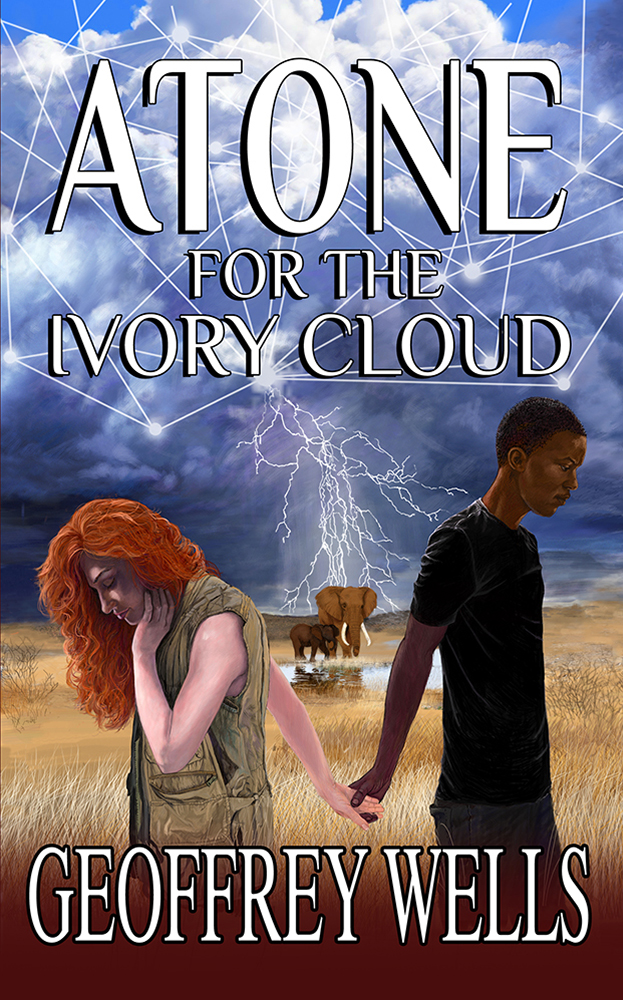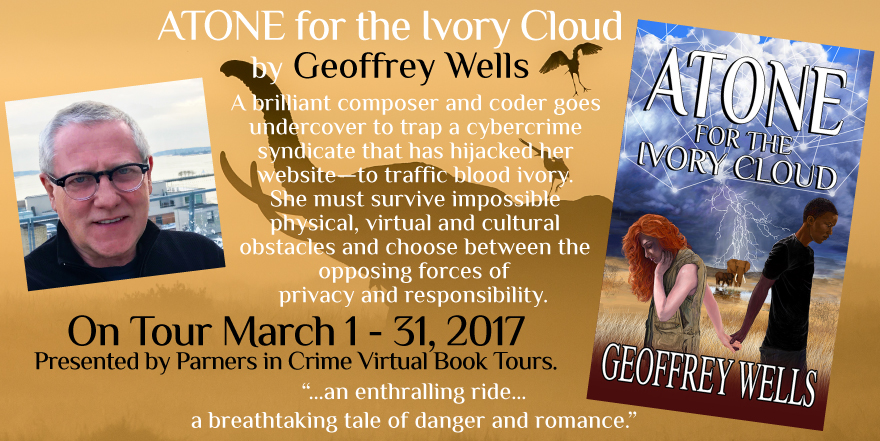ATONE FOR THE IVORY CLOUD by Geoffrey Wells (Guest Post, Showcase & Giveaway)
Atone for the Ivory Cloud
by Geoffrey Wells
March 1-31, 2017 Tour
Synopsis:
 A brilliant composer and coder goes undercover to trap a cybercrime syndicate that has hijacked her website—to traffic blood ivory. She must survive impossible physical, virtual and cultural obstacles and choose between the opposing forces of privacy and responsibility.
A brilliant composer and coder goes undercover to trap a cybercrime syndicate that has hijacked her website—to traffic blood ivory. She must survive impossible physical, virtual and cultural obstacles and choose between the opposing forces of privacy and responsibility.
Allison is stunned when the CIA leaves her no option but to go undercover to surreptitiously modify the code she wrote to protect her symphony. She is deployed from New York with a savvy street vendor to Tanzania, where he is from—and where the cybercrime trail goes dead. Their guarded love affair is sidelined when they are abducted by a trafficker who poaches elephants on a massive scale. To avoid betraying each other they abandon their CIA handlers and return to New York City. Allison must find a way to bring down the syndicate knowing that she might have to sacrifice her symphony, her loved ones and her privacy—for a greater good.
GUEST POST by Geoffrey Wells
To raise awareness of the world’s wild fauna and flora,
I am pleased to offer my ebook at no charge to anyone on
World Wildlife Day, March 3rd, 2017.
Here is the download link: http://dl.bookfunnel.com/ltn8rnj5pp
The United Nations has stated that endangered wildlife trafficking is the 4th largest illegal business in the world. Almost everyone agrees that this is not acceptable. This day will pass by millions of people who will think it’s “nice” to have a day for wildlife. And it is, but there’s more to it, and its success should be measured by what we homo sapiens do, and what we should stop doing.
The irony of this troubling statistic is that world tolerance is skewed—we blindly tolerate this illegal ivory supply chain, perhaps because it is so complex. Yet, conservationists are intolerant of societies and nations that are responsible for consuming wildlife parts, especially African elephant tusks, but the individual black market operators continue trading under the radar.
The United Nations General Assembly decided to proclaim March 3rd as the day of adoption of CITES (the Convention on International Trade in Endangered Species of Wild Fauna and Flora), which “reaffirmed the intrinsic value of wildlife and its various contributions, including ecological, genetic, social, economic, scientific, educational, cultural, recreational and aesthetic, to sustainable development and human well-being, and recognized the important role of CITES in ensuring that international trade does not threaten the species’ survival.”
This high-minded resolution will not change illegal trafficking unless the demand for animal parts is choked off by raising awareness that living wildlife is vastly more valuable than in its dead components.
And, while CITES can define the parameters of value in wildlife manifestos, consumers of animal parts define that value in their belief systems. But to protect wildlife, must traditional societies throw out generations of beliefs based on religion, traditional medicine, personal empowerment and fashion? The intrinsic value that CITES lists pales in comparison to symbolic value that these societies place on animal parts. And so we correctly assume those beliefs cannot be changed. And they won’t. But the representation of those beliefs must change.
In other words, if we want to respect the diversity of value in wildlife, we must respect and tolerate the human belief systems that rely on it, provided they do not use animal parts to symbolize those beliefs. For example, ivory could just as well be marble, jade or granite, and even be shaped into the form of elephant tusks. Rhino horns could just as well be replaced by less expensive ED (erectile dysfunction) drugs—and be more effective.
For me, World Wildlife Day is about the tolerance of diverse world cultures as much as it is about celebrating world wildlife.
I offer my eco/cyber thriller, Atone for the Ivory Cloud to honor World Wildlife Day because it shows the evolution of a character who becomes aware of her own belief systems about elephants.
This story is about Allison, a New York-based electronic composer and coder who must go undercover to trap a cybercrime syndicate that has hijacked her website—to traffic blood ivory. The CIA leaves her no option but to go undercover to set the trap. She must modify the code she wrote to protect her symphony, and is deployed with a savvy street vendor to Tanzania, where he is from—and where the cybercrime trail goes dead. Their guarded love affair is sidelined after being abducted by a trafficker who poaches elephants on a massive scale. To avoid betraying each other they abandon their handlers and return to New York City. Allison must bring down the syndicate or sacrifice her music, her loved ones and her privacy—for a greater good.
World Wildlife Day should be a reminder of how anyone—or, in the case of Allison in my thriller—can go from being unaware of the 30,000 plus elephants poached every year to asserting her conviction about the absolute necessity of bio-diversity and sustainability; because it matters—even in her introspective world of New York.
Book Details:
Genre: Thriller
Published by: Ice Wine Productions, Inc.
Publication Date: February 2017
Number of Pages: 309
ISBN: eBook: 978-0-9981666-0-5, Print: 978-0-9981666-1-2
Purchase Links: Amazon 🔗 | Goodreads 🔗
IVORY TRAFFICKING Trailer for the thriller, Atone for the Ivory Cloud:
Read an excerpt:
Voices. Unintelligible fragments. Words she didn’t recognize. Faint, distant—the sound of city traffic. A tone—plaintive, sung. The smell of cumin. And diesel. Incense. A flurried breath of diaphanous light across the white mosquito net. The awareness of being alive. The air, saturated. Four notes.
Allison stretched out her arm, her hand touching the cold steel pole that held the IV bag. A hissing clamp dug into her nostrils. In a hallway perhaps—nearby—a woman’s voice: elderly, clear, solidified into a black shape in the doorway, the same abaya shape that had stolen her away from the resort—that stole her from him. She shut her eyes and felt adrenaline surge through her. Regulate your breathing, she thought. Her limp arm was carefully lifted and placed inside the mosquito net. Try to ignore the gnawing anguish in your brain. They can’t know yet; they can’t know that you are conscious, that you are Allison Schwartz, that you have forgotten the name of that other person you are supposed to be.
Sleep. Later, the low sun having painted the walls of the room yellow and red, Allison heard the kalimba—her sipho, or was this Sipho himself, luring her from her unconscious mind? Again—four notes: three words and four consonants to go with them—the sum-mer wind. Impossible, yet it could only be him. She listened. Outside on the quiet street, again the four notes played, repeating, waltzing. She woke again. This time painfully, step by step, she detached from the IV and the oxygen tube clamped to her nose. She was able to sit up, to touch the cool ceramic tiled floor with her toes. With a pounding headache, she gingerly hobbled to the open window, taking deep breaths of the humid ocean breeze. How true, she thought, the line from their song about the wind being a fickle friend. Closer—those four notes again.
From her second-story window she peered down into the narrow street, now suffused with hues of blue and purple light, bare lightbulbs here and there spilling yellow across the cobbled road, turning the Muslim pedestrians into silhouetted abstractions that silently shuffled toward the minaret, thin and resolute at the intersection. There, lying on the windowsill, a mobile phone rang with the ringtone she heard. So, no Sipho on the street below, beckoning to her, like Romeo. Yet only he could have thought to create that ringtone, the significance of which only she and he would understand. When she swiped the glass on the phone, she saw her own wallpaper screen. The CALENDAR app date showed that two days had passed.
She had an unread text message, respond.
Behind her, a noise. She scrambled back into the bed, her heart churning as she reattached the oxygen, leaving the IV dangling. She set the phone to mute and tucked it into her panties. She resumed her former comatose state. A burka and abaya-clad woman approached, re-inserted the IV needle, and took Allison’s pulse. Think of nothing, Allison; of Central Park at dawn, when the sleeping snow is left behind and the storm has moved on. Be calm. The woman called out abruptly and left. Allison reached frantically for the phone.
Passcode? She remembered keying it in at Amsterdam airport, the sea of faces coming and going, paying her no attention. How naive she was. She keyed her mother’s phone number, remembering that the agent had told her to swap the first and last numbers.
The reply came back immediately: Pay 50% in bitcoin asap. Use BOX. Have Ts delivered to fabric stall at Kariakoo market – north side of Tandamuti Street. Pay remaining 50% after we weigh/inspect and after they supply 1989 certs. I will get u soon—only text if u have issues. DELETE THIS MESSAGE THEN TURN OFF YOUR PHONE
k, she texted, now thankful for the ingrained system she had been using for years to memorize sheet music: Walking through the score in rehearsal, organizing the sequence of events, elaboration—the assignment of meaning by association, and mapping the score to a familiar location—in this case, Central Park, for which she now pined. As she read the text ten times and applied these principles, she found hope in the message. First, only Sipho and she referred to the device as “the box”, and second, she confirmed that the box was close enough to be discovered by her phone, all of which led her to hope that Sipho had found her. The rest was instructions on how the deal needed to go down—and this, too, meant that her usefulness on this mission had an end point.
She deleted the text.
Author Bio:
 Impressions on a South African farm, boarding school, a father who read from the classics to his children, and a storytelling mother, sparked Geoffrey Wells with a writer’s imagination. Though the piano and drum kits and Mozambique led to his first thriller, A Fado for the River, his career as Art Director in advertising led him to the American Film Institute, and an awe of digital technology propelled him to VP/CIO at Disney, ABC-TV stations and Fox. Wells wrote an award-winning animated film, has visited elephant reserves, and climbed to the tip of Kilimanjaro. He lives on Long Island where he swims the open water and runs a video and design company. He writes thrillers about imperfect characters who, always with a diverse band of allies, fight villains that devastate our natural and virtual ecosystems.
Impressions on a South African farm, boarding school, a father who read from the classics to his children, and a storytelling mother, sparked Geoffrey Wells with a writer’s imagination. Though the piano and drum kits and Mozambique led to his first thriller, A Fado for the River, his career as Art Director in advertising led him to the American Film Institute, and an awe of digital technology propelled him to VP/CIO at Disney, ABC-TV stations and Fox. Wells wrote an award-winning animated film, has visited elephant reserves, and climbed to the tip of Kilimanjaro. He lives on Long Island where he swims the open water and runs a video and design company. He writes thrillers about imperfect characters who, always with a diverse band of allies, fight villains that devastate our natural and virtual ecosystems.
“Atone for the Ivory Cloud is a compelling, fast-paced thriller with an exotic international flavor. Geoffrey Wells takes the reader on an enthralling ride, skillfully entwining cybercrime, music, and the fate of African elephants in a breathtaking tale of danger and romance.”
Pamela Burford, best-selling author of Undertaking Irene.
Catch Up with Geoffrey Wells on his Website 🔗, Twitter 🔗, & Facebook 🔗!
Tour Participants:
Stop by these other great hosts for to learn more about Geoffrey Wells and his book Atone for the Ivory Cloud with inteviews, guest posts, & reviews!

